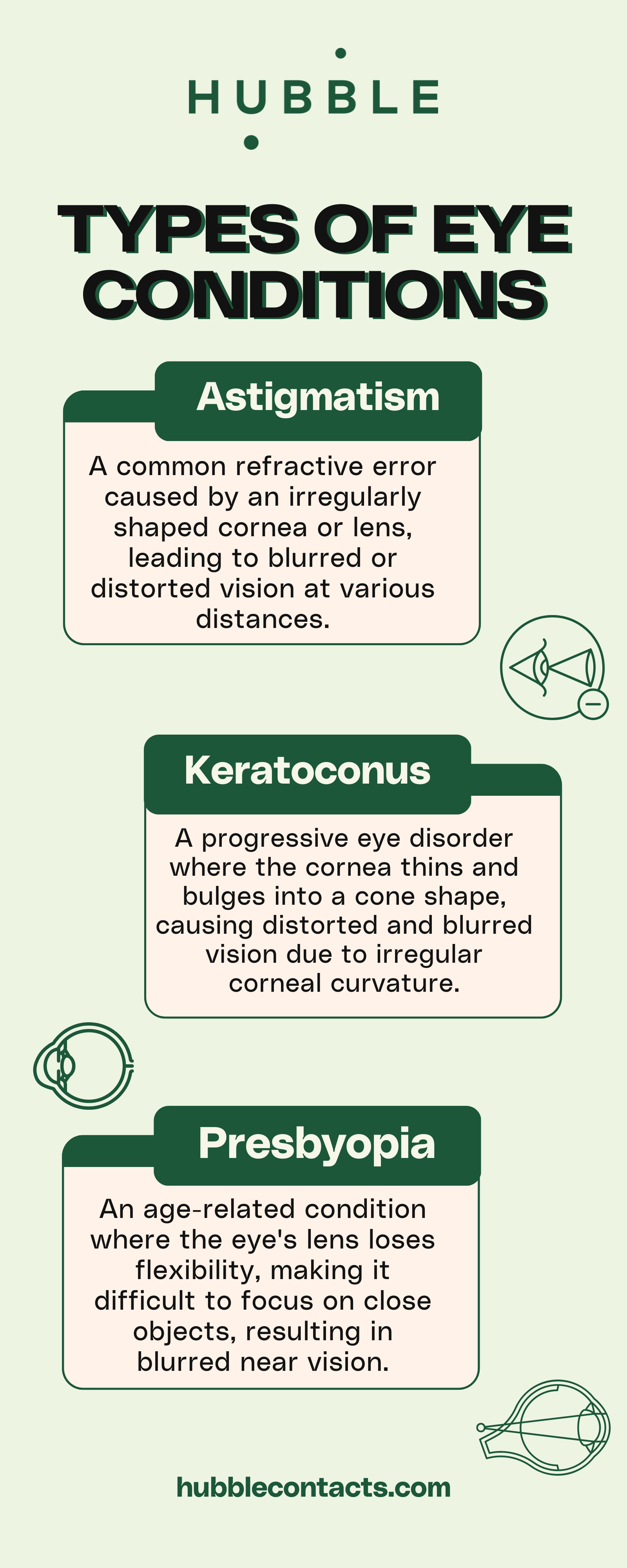Contact Lenses for Special Eye Conditions: What Are Your Options?
Whether you're a seasoned contact lens wearer or just curious about improving your vision, in this article, we’ll be exploring common eye conditions and share tips for comfortable and safe contact lens use for those with unique vision needs.
Before embarking on your quest for specialized contact lenses, remember that your eye care professional is your trusted guide in this journey toward seeing the world with clarity and confidence.
Understanding Special Eye Conditions and Vision Needs

Astigmatism, keratoconus, and presbyopia are special eye conditions that can impact vision:
Astigmatism is a common refractive error caused by an irregularly shaped cornea or lens, leading to blurred vision at all distances. Contacts for astigmatism are usually called toric lenses, which contain different powers in different meridians of the lens to help compensate for the irregular shape of the cornea and provide clearer vision.
Keratoconus is a progressive eye disorder where the cornea thins and bulges into a cone shape, distorting vision. Keratoconus contact lenses play a crucial role in improving vision for individuals with this eye condition. Rigid Gas Permeable (RGP) lenses are a popular choice for keratoconus as they provide stable correction by compensating for corneal irregularities.
Contact lenses for presbyopia offer a solution for individuals experiencing difficulty focusing on objects up close due to age-related changes in the eye's lens.
Living with Astigmatism: Challenges and Lens Options
Toric contact lenses are a type of contact lens designed to correct astigmatism, which is an irregular curvature of the cornea or lens of the eye that causes blurred or distorted vision. Toric lenses have different powers in different meridians of the lens to help the light focus properly on the retina, providing clearer vision. Because traditional contacts will not help correct vision, it is important to see an eye doctor or vision specialist who can properly diagnose astigmatism and prescribe the correct contact lenses.
Navigating Vision with Keratoconus
Are you navigating the challenges of keratoconus and seeking a solution for clearer vision? Look no further than rigid gas permeable (RGP) lenses. Keratoconus contact lenses are specialized contact lenses that offer unique benefits and customization options tailored to manage keratoconus effectively.
RGP contact lenses are rigid, durable contacts made from gas-permeable materials that allow oxygen to reach the cornea, ensuring eye health while providing stable vision correction. Unlike soft lenses, RGPs maintain their shape on the cornea, compensating for irregularities caused by keratoconus.
RGP Lenses can offer several benefits:
Sharper Vision - RGP lenses provide crisp, clear vision by creating a smooth optical surface on the cornea, correcting refractive errors associated with keratoconus.
Durability - These lenses are long-lasting and resistant to protein deposits, offering consistent vision correction over time.
Customization Options - RGP lenses can be customized to fit the unique shape of your cornea, ensuring optimal comfort and visual acuity.
Managing Keratoconus with RGP Lenses:
Stable Correction - RGP lenses provide stable correction for the irregular corneal shape characteristic of keratoconus, improving visual acuity and reducing distortion.
Regular Monitoring - Regular follow-ups with your eye care provider are essential to monitor the fit and effectiveness of RGP lenses in managing keratoconus.
Choosing the Right Fit: When considering RGP lenses for keratoconus, it's crucial to consult with an eye care professional who specializes in fitting these lenses. Customization options such as lens diameter, base curve, and edge design ensure a comfortable fit and optimal vision correction tailored to your specific needs.
Exploring Contact Lens Options for Special Conditions
Contact lenses present many advantages for those who use and wear them regularly. The correction of vision is generally a more advantageous reason for wearing contacts. Various types of contact lenses are suitable for different eye conditions, offering solutions to correct vision problems effectively. Below is a summary of the types of contact lenses suitable for various eye conditions:
Toric Lenses for Astigmatism
Prescription contact lenses for astigmatism are specialized contact lenses that cater to the unique needs of individuals with astigmatism addressing the irregular corneal shape characteristic of this condition.
RGP lenses are a viable option for people with mild astigmatism as they maintain their shape over the cornea, compensating for irregular corneal shapes and providing sharper vision.
Toric lenses are specifically designed to address astigmatism by creating different focusing powers to correct corneal or lenticular astigmatism. They have a thicker zone to prevent rotation in the eye, ensuring consistent visual acuity. Achieving an exact fit is crucial for toric lenses to maintain clear vision. They have a specific axis to keep the line of vision clear, emphasizing the importance of proper fitting for optimal results
Soft toric lenses offer comfort, stability, and clear vision for individuals with astigmatism. The effectiveness of toric lenses is usually higher than that of traditional contacts, because of the way they are made to statically lay on the cornea, providing a better field of vision. Toric lenses are soft which increases ease of wear.
Selecting the Right Contact Lenses for Your Unique Vision Needs
To best manage astigmatism, keratoconus, or presbyopia, it is key to consult with an eye care professional for long-term eye health and vision, and selection of contact lenses. Selecting the right contact lenses for overall clearer vision begins with an eye examination with an optometrist or ophthalmologist. These eye care professionals will assess your eye health, prescription, and specific needs. Choosing your contact lenses based on different contact lens materials that offer varying levels of oxygen permeability or even moisture retention is another consideration. Using contact lenses that have a higher water content provides more comfort for individuals.
Comfort and Adaptation: Finding the Best Fit
Specialty contact lens wearers will have an adaptation period where their eyes and brains adjust to the different prescription zones within the lens. During this time, individuals may notice variations in vision or depth perception. This learning curve will not only be based on how well your eyes physically adjust but also on how quickly you adapt to cleaning & sanitizing your lenses and placing & removing the contact lenses. Remember, patience is essential for optimal comfort.
Professional Advice: Consulting with an Eye Care Specialist
Whether you're dealing with astigmatism, keratoconus, presbyopia, or any other eye condition, selecting the right contact lenses is a crucial step toward clearer vision and enhanced comfort. But before diving into the sea of options, there's one essential partner you shouldn't overlook – your trusted eye care professional.
While it may be tempting to pick a pair of contact lenses based on aesthetics or online reviews, there's more to consider than meets the eye. Here's where your eye care professional steps in as your vision ally:
Proper Fit - Did you know your eyes are as unique as your fingerprint? An eye care professional will conduct a comprehensive eye exam to assess your eye health, corneal shape, and vision needs, ensuring a precise fit for optimal comfort and vision correction.
Personalized Guidance - With their expertise and experience, eye care professionals can recommend the most suitable type of lens for your specific condition, lifestyle, and preferences. From toric lenses for astigmatism to scleral lenses for keratoconus, they'll guide you toward the best choice.
Ongoing Support - The journey doesn't end once you've chosen your lenses. Regular follow-ups with your eye care professional are essential to monitor your eye health, assess the fit of your lenses, and make any necessary adjustments for continued comfort and clear vision.
Hubble Contacts and Contacts Cart: Choosing the Best Specialized Solution
If you are looking for specialty contacts for astigmatism, toric lenses, 90-day supplies, or even color lenses, discover many types of lenses available at Hubble’s sister site ContactsCart. Shop by brand or lens type and find the perfect contacts to fit your needs and lifestyle.
Over at Hubble, we offer hassle-free, contact lens ordering through our personalized subscription service. Hubble contacts are delivered to your door and make ordering contact lenses easy and convenient. Pay $1 for your first 15 pairs of Classic by Hubble daily contact lenses. Ordering contacts through Hubble and Contacts Cart ensures an endless choice of contact lens brands and contact lenses that fit you perfectly.
Empowering Your Vision with the Right Choices
Contact lenses tailored for astigmatism, keratoconus, and presbyopia provide a convenient and effective way to address vision-specific concerns, offering clear sight while maintaining comfort and visual acuity.
At Hubble and Contacts Cart, we aim to be the one-stop destination for all of your vision needs, including contact lenses, eyeglasses, and eye care accessories. We’ve reimagined the contact lens experience from the ground up, with our signature daily contacts subscription service. Your eyes are unique, and your contact lenses should be too. And with FDA-approved lenses and a user-friendly approach, Hubble Contacts is here to provide you with clear and comfortable vision for less.



